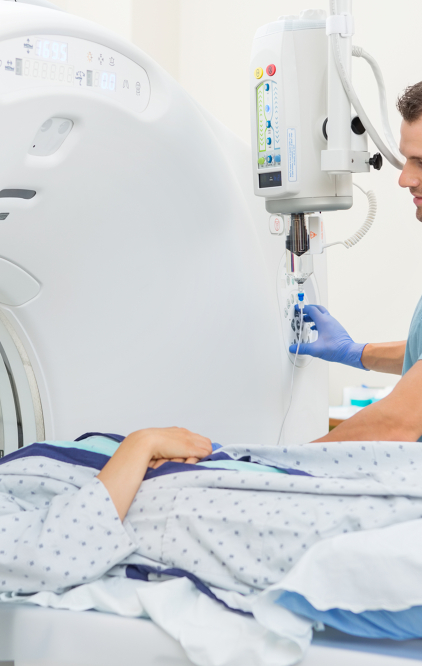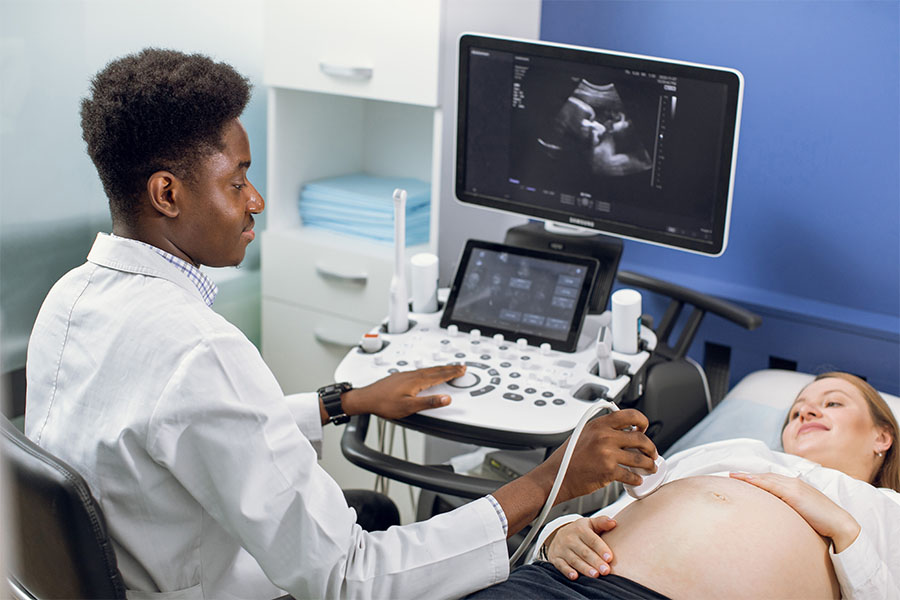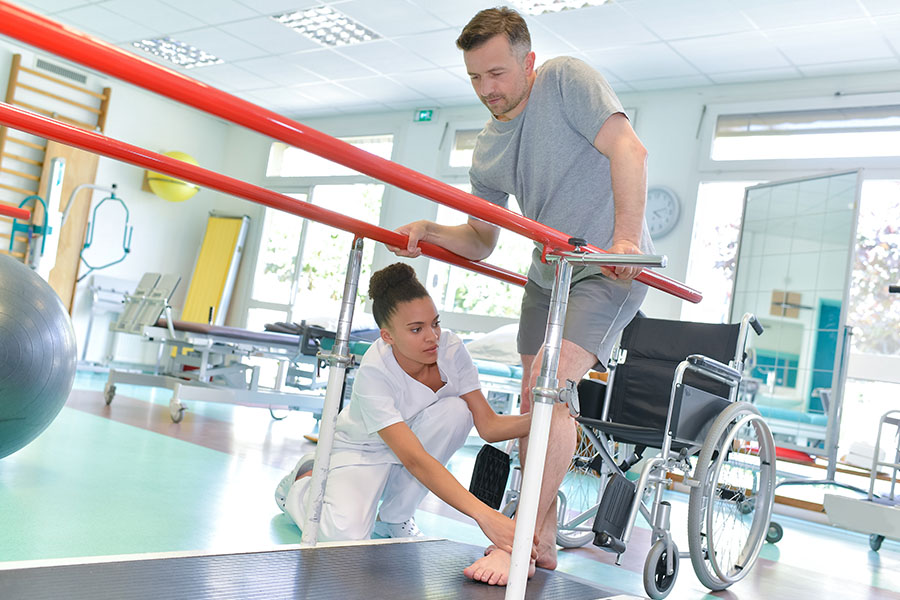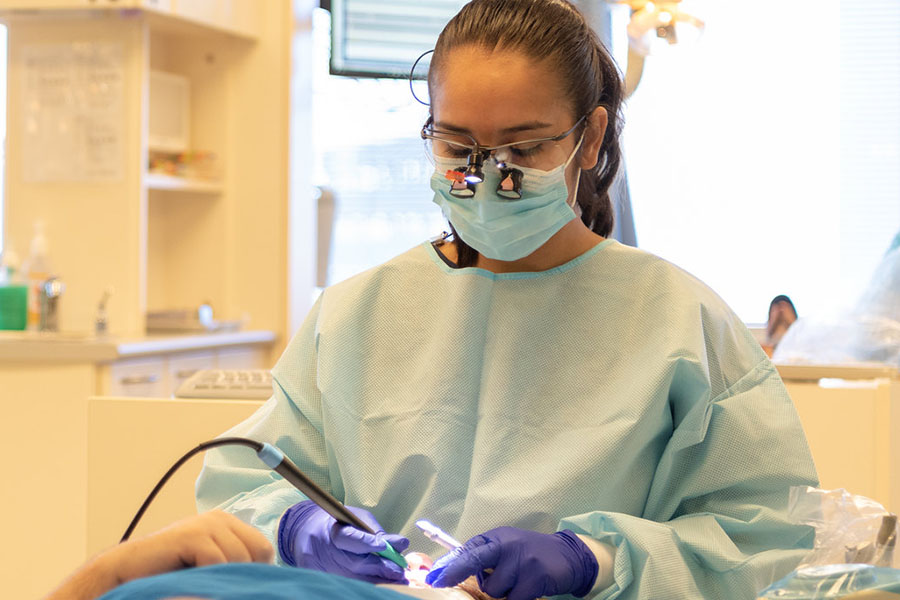An education in Radiologic Sciences can lead in many directions, since demand is high with increasingly sophisticated health care. Specializations include mammography, computed tomography, magnetic resonance imaging (MRI), cardiovascular-interventional technology and nuclear medicine. Whether you consider yourself technically adept or not, this program will set you up for success — it’s part science, part art!
Radiologic Sciences at a Glance
8 months-2 years to complete1
$1,683-$2,376 tuition2
- Brookhaven
- El Centro3
2 years to complete1
$4,554 tuition2
- Brookhaven3
What Can I Study?
I Want to Go to Work
Dallas College offers fast, flexible credentials designed with local employers to help you quickly start or advance your career.
-
Credit Certificates
- Computed Tomography Advanced Technical Certificate $1,683 8 months
- Magnetic Resonance Imaging Advanced Technical Certificate $2,079 1 year
- Vascular Interventional Advanced Technical Certificate $2,376 1 year
Can I Get a Job?
Dallas College offers a variety of certificates and degrees to help you gain the skills you need to start working right away.
- These credentials are often considered Career and Technical Education (CTE).
- These credentials are established with the assistance and cooperation of representatives from local business, to meet local and regional employment needs.
- Higher level certificates and degrees will typically lead to a higher salary in the workforce.
- Workforce (CE) Certificates can often be completed faster than traditional credit certificates but typically do not offer college credit.
- Level 1, Level 2, Enhanced Skills certificates and others, offer college credit and are often stackable to help you build skills as you work towards an Associate Degree.
- Workforce credentials may give you college credit at Dallas College, but they may not transfer to other colleges or universities.
If you're unsure if this is the right path for you, you can talk to a Pathway Specialist for advice.
Pathway Specialist
- 972-669-6400
- AskSOHS@DallasCollege.edu
What Can I Earn? Will There Be Plenty of Jobs?
With medical imaging and patient care skills, you can play a key role in providing quality health care. Check out a few of the incredible career opportunities you’ll be ready for. Your future starts here!

Magnetic Resonance Imaging (MRI) Technologists
$49/hr
Median Salary
53
Job Openings
+27%
Projected Outlook
Top Skills:
- Reading Comprehension
- Active Listening
- Monitoring
- Speaking
- Operations Monitoring
- Critical Thinking
- Operation and Control
- Social Perceptiveness
- Writing
- Active Learning

Nuclear Medicine Technologists
$51/hr
Median Salary
21
Job Openings
+14%
Projected Outlook
Top Skills:
- Critical Thinking
- Active Listening
- Speaking
- Reading Comprehension
- Monitoring
- Writing
- Social Perceptiveness
- Science
- Coordination
- Service Orientation

Radiologic Technologists
$38/hr
Median Salary
387
Job Openings
+16%
Projected Outlook
Top Skills:
- Active Listening
- Social Perceptiveness
- Reading Comprehension
- Speaking
- Service Orientation
- Monitoring
- Critical Thinking
- Operation and Control
- Coordination
- Operations Monitoring
All jobs data gathered for Dallas/Fort Worth. Source: Dallas College Labor Market Intelligence and Lightcast4.
“When a patient who is in pain, upset or nervous tells you that you made them feel better or just simply tells you 'thank you' with a smile, it makes your hard work worth it. That is the reason I am in this field, and that is what will keep me in it forever.” Read Myriah Stevens's story.

As a part of your training in Radiologic Sciences, you’ll study subjects such as anatomy, physics, radiation safety, communication and computer skills specific to your career. Because our comprehensive programs include clinical rotations, you’ll have a hands-on opportunity to practice patient care skills and technical knowledge. You’ll work side-by-side in radiology departments with doctors, nurses and experienced radiologic technologists.
In addition to the Radiologic Technology AAS, the Radiologic Sciences program offers three advanced certificate programs for ARRT technologists to broaden their clinical experience and certifications:
- Computed Tomography Certificate
- Vascular Interventional Certificate
- Magnetic Resonance Imaging (MRI) Certificate
Completion of the required classroom, lab and clinical components with a grade of C or above will result in a certificate in the related track. Students may choose not to take clinical courses if they have access to the experience on their own to achieve the ARRT procedural requirements.
Computed Tomography Certificate
The Computed Tomography certificate trains ARRT technologists to use radiation to produce cross-sectional images of a patient. The images are then used by a physician to make a diagnosis.
The certificate is a single 16-week-semester program. It is offered in both Fall and Spring semesters. Classes and labs are held at Brookhaven Campus on Mondays and Wednesdays from 5-8:50 p.m. Clinical experience requires 24 clock-hours per week.
Vascular Interventional Certificate
The Vascular Interventional certificate trains ARRT technologists to use radiation and advanced patient care skills to produce vascular images of a patient. The images are then used by a physician to make a diagnosis.
The certificate is a 20-week program that includes class time at Brookhaven Campus in the VIR Suite, which includes lab simulation using our Robotic Phantom. Classes and labs are held at Brookhaven Campus on Tuesdays and Thursdays from 5-8:50 p.m. and Saturday hours during Fall, Spring and Summer semesters. Clinical experience is eight clock-hours per week in the Fall semester and 24 clock-hours per week in Spring and Summer.
Magnetic Resonance Imaging (MRI) Certificate
The Magnetic Resonance Imaging Advanced Technical certificate trains ARRT technologists to produce cross-sectional and 3D images of a patient. The images are then used by a physician to make a diagnosis.
The certificate is a three-semester program that begins each Spring. The program includes class and lab time in our dedicated, onsite MRI trailer (1.5-ton MRI scanning suite), which is an actual MRI scanning environment for student lab learning time. Dallas College offers this revolutionary, onsite MRI scanning lab experience as compared to online programs with no hands-on experience or online simulation programs.
Classes and lab time are held at Brookhaven Campus on Tuesdays and Thursdays from 5-8:50 p.m. during Spring, Summer and Fall semesters. Clinical experience begins in late February each year and requires 24 clock-hours per week.
The Radiologic Sciences program has its own admissions process, timeline, requirements and curriculum. Visit the School of Health Sciences Information Packets and Sessions page to view the Radiologic Sciences information packets.
This program also requires a criminal background check and drug testing.
How to Apply
When you're ready to apply, email LDonaldson@DallasCollege.edu with the subject line "Application for (your chosen program)". Please include your full name, Dallas College student ID number and phone number in your email. You will receive a response with instructions on how to complete the online application process.
Download the latest Radiological Sciences Information Packet
Accreditation and Affiliations
The Radiologic Sciences program is accredited by the
Joint Review Committee on Education in Radiologic Technology
20 N. Wacker Drive, Suite 285
Chicago, IL 60606
312-704-5300
Email: mail@jrcert.org
The program’s current award is eight years. General program accreditation information and the current accreditation award letter can be found on the JRCERT website.
A graduate of the program will be eligible to take the national registry examination administered by the American Registry of Radiologic Technologists (ARRT). If successful on the exam, the graduate will become a Registered Radiologic Technologist (R.T.(R)) and be eligible to be licensed by the Texas Medical Board as a General Medical Radiologic Technologist.
The following is the most current program effectiveness data. Our programmatic accreditation agency, the Joint Review Committee on Education in Radiologic Technology (JRCERT), defines and publishes this information. Visit the JRCERT webpage.
Credentialing Examination
The number of students who pass, on the first attempt, the American Registry of Radiologic Technologists (ARRT) certification examination, or an unrestricted state licensing examination, compared with the number of graduates who take the examination within six months of graduation. The five-year average benchmark established by the JRCERT is 75%.
| Credentialing Examination Rate | number passed on 1st attempt divided by number attempted within 6 months of graduation |
|---|---|
| Year | Results |
| Year 1 - 2024 | 56 of 61 - 89% |
| Year 2 - 2023 | 56 of 61 - 92% |
| Year 3 - 2022 | 26 of 27 - 96% |
| Year 4 - 2021 | 23 of 25 - 92% |
| Year 5 - 2021 | 31 of 31 - 100% |
| Program 5-Year Average | 192 of 206 - 93% |
Job Placement
The number of graduates employed in the radiologic sciences compared to the number of graduates actively seeking employment in the radiologic sciences within twelve months of graduating. The five-year average benchmark established by the JRCERT is 75%.
| Job Placement Rate | number employed divided by number actively seeking employment within 12 months of graduation |
|---|---|
| Year 1 - 2024 | 56 of 61 - 89% |
| Year 2 - 2023 | 59 of 60 - 98% |
| Year 3 - 2022 | 28 of 28 - 100% |
| Year 4 - 2021 | 25 of 25 - 100% |
| Year 5 - 2020 | 29 of 31 - 94% |
| Program 5-Year Average | 199 of 204 - 98% |
Program Completion
The number of students who complete the program within the stated program length. The annual benchmark established by the program is 75%.
| Program Completion Rate | number graduated divided by number started the program |
|---|---|
| Year | Results |
| Year 2024 | 61 of 78 - 78% |
| Annual Completion Rate | 78% |
Find Out More About Radiologic Sciences
Sign up to receive additional information about Radiologic Sciences or call 972-669-6400.
School of Health Sciences
- 972-669-6400
- AskSOHS@DallasCollege.edu
Dallas College
- 972-669-6400
- Text College to 214-978-6457
- StudentHelp@DallasCollege.edu
1Length of time is based on catalog degree plans. Prerequisites may be required, which are not included in this estimate. For most programs, full-time student status is assumed, a minimum of 12 credit hours per semester.
2Cost is based on tuition rates for program hours for Dallas County residents. The price of most required learning materials (books, software, supplies, etc.) is included with the price of tuition. Visit our Paying for College site to learn more about cost, financial aid, scholarships and more.
3Each location offers a unique combination of certificate and degree options. Not all degree and certificate offerings are available for admission/start at all campuses every semester.
4A portion of Lightcast’s data comes from O*NET Online by the U.S. Department of Labor, Employment and Training Administration (USDOL/ETA). Used under the CC BY 4.0 license. O*NET® is a trademark of USDOL/ETA. Lightcast has modified all or some of this information. USDOL/ETA has not approved, endorsed, or tested these modifications.
HB1508 Notice
This program may lead to an occupational license for which a prior criminal history may make a student ineligible.
For more information, please visit DallasCollege.edu/hb1508.





